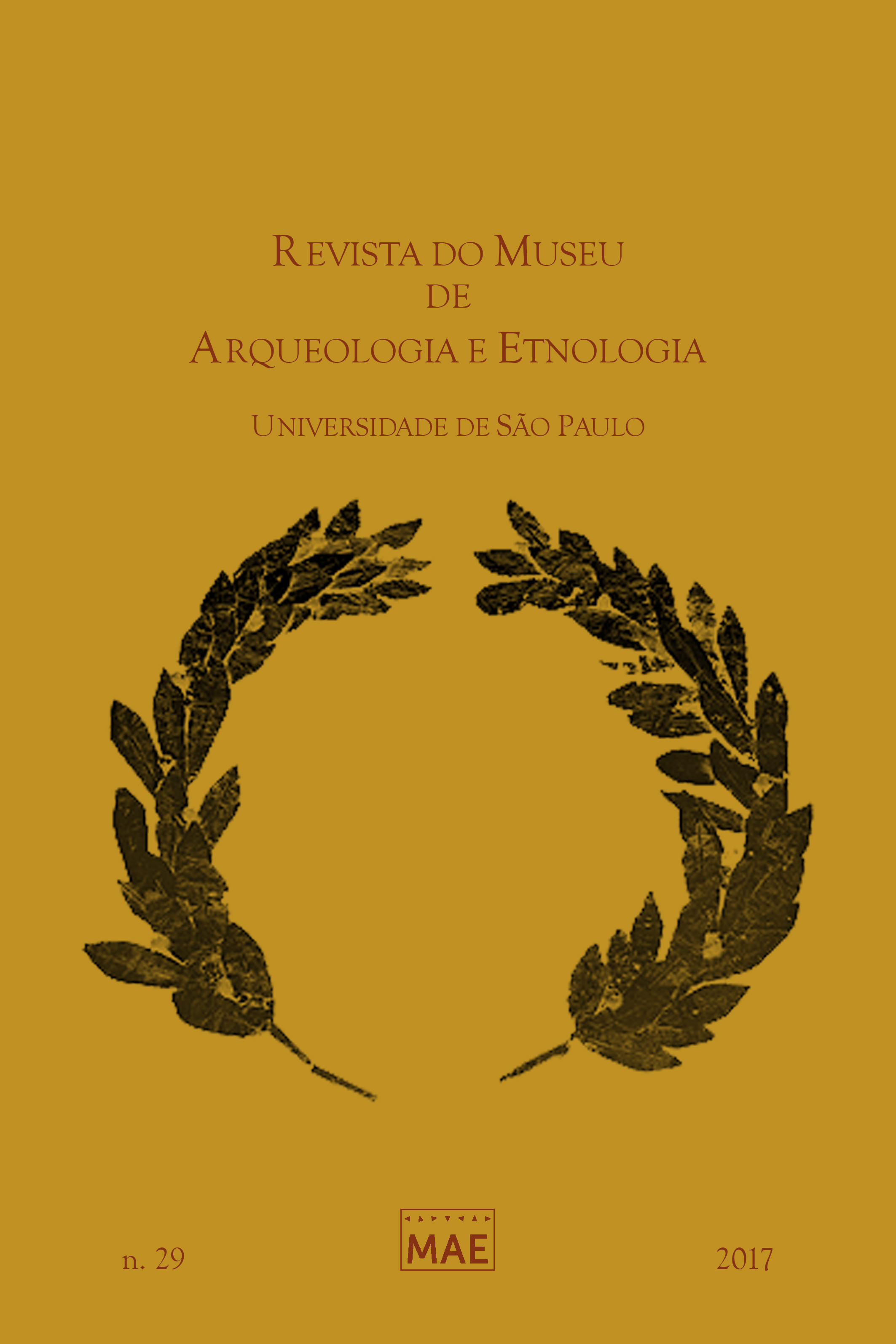Competitive spaces: monarchical euergetism, urban space and integration in Hellenistic Athens (2nd century BC)
DOI:
https://doi.org/10.11606/issn.2448-1750.revmae.2017.154938Keywords:
Agonistic culture, Hellenistic euergetism, Great PanathenaiaAbstract
After the critique of the ‘polis decadence’ model in the study of Hellenistic societies, many scholars started stressing the centrality of the ‘agonistic culture’ for the history of Mediterranean urban landscapes and international relations. Athens, a polis as culturally prestigious as militarily fragile, used its agonistic traditions to construct euergetic relations with Hellenistic monarchs. This article discusses the interaction between agonistic culture, euergetic practices, and integration processes, using the spatial interventions in the Athenian urban space during the second century BC as a case study. They are related to monarchical euergetism and to the Great Panathenaia
Downloads
References
American School of Classical Studies at Athens. 1953. Monument base at the northwest corner of the Middle Stoa terrace. Disponível em: <https://goo.gl/BFypc9>. Acesso em: 26/3/2018.
American School of Classical Studies at Athens. 1958. The Donor’s Monument partially restored.
Disponível em: <https://goo.gl/6gdTkd>. Acesso em: 26/3/2018.
Anderson, R.C. 1992. General plan of the Agora in the 2nd century A.D. Disponível em: <https:// goo.gl/CXSFC2>. Acesso em: 26/3/2018.
Andreau, J.; Schnapp, A.; Schmitt-Pantel P. 1978. Paul Veyne et l’évergétisme. Annales: Économies, Sociétés, Civilisations 33 (2): 307-325. Conrad, S. 2016. What is global history? Princeton University, Princeton.
Crossley, P. 2008. What is global history? Polity, Cambridge.
Dinsmoor, W. B. 1920. The monument of Agrippa at Athens (abstract). American Journal of Archaeology, 24:83.
Gauthier, P.H. 1995. Notes sur les rôles du gymnase dans les cités hellenistiques. In: Wörrle, M.; Zanker, P. (Eds.). Stadtbild und Bürgerbild im Hellenismus. C. H. Beck, München, 1-11.
Guarinello, N. 2003. Uma morfologia da História: as formas da História Antiga. Politeia 3 (1): 41-61.
Gygax, M.D. 2016. Benefactions and rewards in the ancient Greek city: the origins of euergetism. Cambridge University, Cambridge.
Hansen, M. 1995. The “Autonomous City-State”: ancient fact or modern fiction? In: Hansen, M.H.; Raaflaub, K. (Eds.). Studies in the Ancient Greek Polis. Franz Steiner, Stuttgart, 21-43.
Hansen, M.; Nielsen, T.H. 2004. An inventory of archaic and classical poleis. Oxford University, Oxford.
Hildebrandt, B.; Gillis, C. (Eds.). 2017. Silk: trade & exchange along the silk roads between Rome and China in antiquity. Oxvow, Havertown.
Horden, P.; Purcell, N. 2000. The corrupting sea: a study of Mediterranean history. Blackwell, Oxford.
Korres, M. 2000. Αλαζεκαηηθά θαη ηηκεηηθά ηέζξηππα ζηελ Αζήλα θαη ηνπο Γειθνύο. In: Jaquemin, A. (ed.). Delphes cent ans après la Grande fouille. Essai de bilan. Actes du colloque organisé par l‟EFA, 17-20 septembre1992. EFA, Athènes, 293-329.
Lloyd, G.; Zhao, J.; Dong, Q. (Eds.). 2018. Ancient Greek and China compared. Cambridge University, Cambridge.
Marchetti, P. 2012. Métamorphoses de l’agora d’Athènes à l’époque augustéenne. In: Cavalier, L.; Descat, R.; Courtils, J. (Eds.). Basiliques et agoras de Grèce et d’Asie Mineure. Ausonius, Bordeaux, 207-223.
Morales, F. 2014. A democracia ateniense pelo avesso: os metecos e a política nos discursos de Lísias. Edusp, São Paulo.
Morales, F. 2015. Atenas e o Mediterrâneo romano: espaço, evergetismo e integração (200 a.C. – 14 d.C.). Tese de Doutorado em História. Universidade de São Paulo, São Paulo.
Nielsen, T.H. 2016. Reflections on the number of athletic competitions in pre-Hellenistic Greece. In: Mann, C.; Remijsen, S.; Scharff, S. (Eds.). Athletics in the Hellenistic world. Franz Steiner, Stuttgart, 31-41
Olstein, D. 2014. Thinking History globally. Palgrave Macmillan, London.
Parker, R. 2004. New ‘Panhellenic’ Festivals in Hellenistic Greece. In: Schlesier, R.; Zellmann, U. (Eds.). Mobility and travel in the Mediterranean from antiquity to the Middle Ages. Lit, Münster, 9-22.
Perry, C. 2013. Pedestal of Agrippa. Disponível em: <https://goo.gl/BwEY5H>. Acesso em: 26/3/2018.
Pleket, H. 2014. Sport in Hellenistic and Roman Asia Minor. In: Christesen, P.; Kyle, D. (Eds.). A Companion to sport and spetacle in Greek and Roman antiquity. Wiley-Blackwell, Oxford, 364-375.
Robert, L. 1984. Discours d’ouverture. In: Hypourgeio Politismou kai Epistēmōn. Praktika tou 8. diethnous synedriou hellenikes kai latinikes epigraphikes. Epigraphiko Mouseio, Athēna, 35-45.
Scheidel, W. 2009. (Ed.). Rome and China: comparative perspectives on ancient world empires. Oxford University, Oxford.
Scheidel, W. 2015. State power in ancient China and Rome. Oxford University, Oxford.
Shear, J.L. 2001. Polis and Panathenaia: the history and development of Athena’s Festival. Doctoral dissertation in Art and Archaeology of the Mediterranean World. University of Pennsylvania, Pennsylvania.
Thonemann, P. 2007. Magnesia and the Greeks of Asia (I. Magnesia 16.16). Greek, Roman and Byzantine Studies (47): 151-160.
Van Nijf, O. 2013. Ceremonies, athletics, and the city: some remarks on the social imaginary of the Greek city of the Hellenistic period. In: Stavrianopoulou, E. (Ed.). Shifting social imaginaries in the Hellenistic period: narrations, practices, and images. Brill, Leiden, 207-232.
Van Nijf, O.; Alston, R. 2011. Political culture in the Greek city after the Classical Age. Peeters, Leuven.
Veyne, P. 1969. Panem et circensis: l’évergétisme devant les sciences humaines. Annales: Économies, Sociétés, Civilisations 24 (3), 785-825.
Veyne, P. 1976. Le pain et le cirque: sociologie historique d’un pluralism politique. Éditions du Seuil, Paris.
Vlassopoulos, K. 2007. Unthinking the Greek polis: ancient Greek history beyond the eurocentrism. Cambridge University, Cambridge.
Vlassopoulos, K. 2013. Greeks and Barbarians. Cambridge University, Cambridge.
Wiemer, H.-U. [S.d]. Festival in Hellenistic cities: reflection on theis meaning and functions. Disponível em: <https://goo.gl/itUH7u>. Acesso em: 1/12/2017.
Zuiderhoek, A. 2009. The politics of munificence in the Roman Empire. Cambridge University, Cambridge.
Downloads
Published
Issue
Section
License
Copyright (c) 2017 Fábio Augusto Morales

This work is licensed under a Creative Commons Attribution-NonCommercial-NoDerivatives 4.0 International License.













